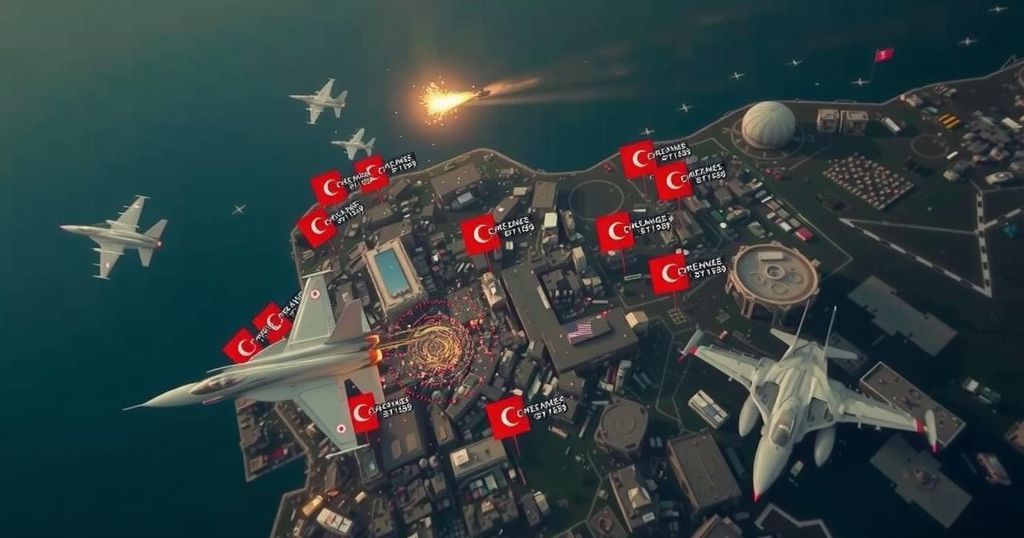Turkey Strikes Kurdish Areas in Syria and Iraq Following Attack in Ankara
Turkey conducted airstrikes against Kurdish regions in Syria and Iraq, killing 12, including 2 children, in retaliation for an attack in Ankara that killed 4. The SDF condemned the strikes as indiscriminate, while the U.S. has yet to comment on the situation. Tensions arise as negotiations with the PKK’s imprisoned leader suggest a possible end to hostilities, complicating the relationship further between Turkey and Kurdish forces.
Turkey initiated airstrikes late on Wednesday targeting Kurdish-controlled regions in Syria and Iraq as a reprisal for an assault on a state-owned defense facility in Ankara. This incident involved at least two assailants who tragically resulted in the deaths of four individuals and injured more than a dozen others. President Recep Tayyip Erdogan attributed the attack to the Kurdistan Workers’ Party (PKK), condemning it as a “nefarious” act against the Turkish Aerospace Industries headquarters situated near the capital. Footage confirmed by CBS News depicted damage to electrical systems in the Kurdish towns of Kobani and Qamishli, the latter being the unofficial administrative center of the Kurdish-majority area in northeastern Syria. The Syrian Democratic Forces (SDF), who maintain a close alliance with the United States, reported on Thursday that twelve people had been killed—among them two children—and that twenty-five others sustained injuries due to the extensive Turkish air and artillery strikes. The Turkish defense ministry declared that it targeted 47 “terrorist sites” within Syria and Iraq. General Mazlum Abdi, commander of the SDF, denounced the Turkish offensive as indiscriminate, asserting that it caused damage to civilian infrastructure, including healthcare facilities. He stated, “We have repeatedly shown our readiness for dialogue. Meanwhile, we affirm that our forces are ready to defend our people and land.” Currently, approximately 900 U.S. forces remain stationed in the region as part of the international coalition focused on fighting ISIS, and the SDF has historically served as a principal partner for the United States in northeastern Syria. However, as of Thursday morning, the U.S. Department of Defense and Central Command had yet to issue statements regarding either the attack in Ankara or Turkey’s subsequent military actions. The Turkish government perceives the SDF—along with its civilian counterpart, the People’s Protection Units (YPG)—as directly affiliated with the PKK. This organization, which has been designated as a terrorist group by both Turkey and the United States, has its base of operations in the Qandil Mountains of northern Iraq, where Turkey frequently conducts military operations. No group has taken responsibility for Wednesday’s assault in Ankara, which occurs amidst renewed discussions between the Turkish administration and Abdullah Ocalan, the PKK’s imprisoned leader. On Thursday, Ocalan’s nephew, Omer, who serves in the Turkish parliament, communicated a message indicating that the PKK leader is willing to pursue peace to end the long-standing conflict that began in the mid-1980s. Devlet Bahceli, an ally of President Erdogan and leader of the Nationalist Movement Party, previously invited Ocalan to address parliament and suggested that the 75-year-old could be granted parole in exchange for the disbanding of the PKK.
The ongoing conflict in Turkey involving the PKK has persisted for several decades, primarily rooted in issues related to Kurdish rights and autonomy. The PKK has been engaged in an insurgency against the Turkish government, seeking greater political representation and autonomy for the Kurdish population within Turkey. Simultaneously, the U.S. has cultivated alliances with the SDF and YPG in the fight against ISIS, often creating a complex relationship between Turkish military objectives and U.S. foreign policy in the region. The resurgence of violence, such as the recent attack in Ankara, complicates the already strained relations between Turkey and its Kurdish entities, raising concerns about regional stability and security.
The recent Turkish airstrikes in Kurdish territories of Syria and Iraq represent a significant escalation in the ongoing conflict involving Turkey and Kurdish forces, primarily the PKK. The strikes, which resulted in civilian casualties and damaged crucial infrastructure, underline Turkey’s commitment to targeting what it identifies as terrorist threats amid ongoing tensions with Kurdish groups. Furthermore, the backdrop of potential reconciliatory efforts involving the PKK’s leadership suggests a precarious balance between military action and dialogue. As military operations continue and discussions unfold, the situation remains highly volatile, with implications for U.S. involvement and regional dynamics.
Original Source: www.cbsnews.com




Post Comment